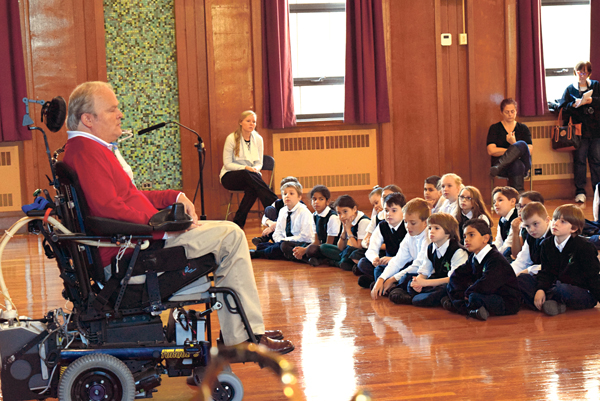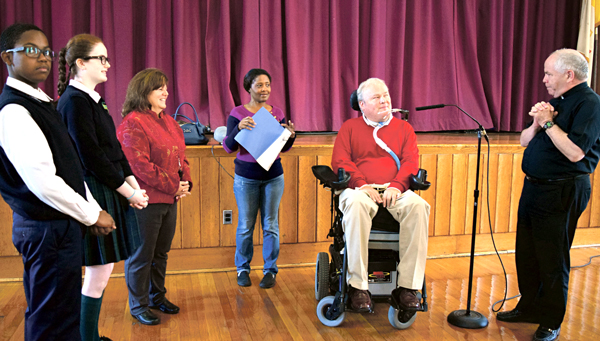By Antonina Zielinska
In the late 1960s, NYPD Detective Steven McDonald was a young Irish-Catholic cop hoping to be an agent of peace in a violence-stricken city and country. His efforts left him paralyzed and wheelchair bound, but not silent.

Continuing his effort to spread a message of love and forgiveness, he visited St. Patrick Catholic Academy, Bay Ridge, Nov. 4 and spoke to the entire student body, as well as teachers, faculty and guests from the community.
Sitting in his wheelchair in the auditorium, McDonald spoke plainly, neither exaggerating the emotions to the story he has repeated many times, nor hiding the difficulty he had in speaking of the tragedy that has changed his life.
It was the summer of 1968. The country was recovering from the assassination of Dr. Martin Luther King Jr.
To help tend to the wounds caused by the assassination and the violence that gripped the nation, a presidential candidate at the time, Senator Robert Kennedy, addressed the nation with what came to be known as his “Mindless Menace of Violence” speech.
To help the young Bay Ridge students better understand the context of the time, McDonald played them an audio recording of the speech.

“Some look for scapegoats, others look for conspiracies, but this much is clear; violence breeds violence, repression brings retaliation, and only a cleaning of our whole society can remove this sickness from our soul,” Senator Kennedy had said.
The senator and presidential hopeful was killed 62 days after he made that speech.
Locally, McDonald explained, drugs, much as they do now, brought violence into the city.
Nonetheless, McDonald wanted to serve the people of New York City, just as his family has done for generations. Being an officer was his way of answering the call of his faith to be a peacemaker in the world.
July 12, 1986 seemed to be just another day on the job. Detective McDonald and Sergeant Peter King were in an unmarked vehicle wearing civilian clothes. Their patrol brought them to Central Park where a group of young teenage boys – 13, 14 and 15 – seemed to be up to no good.
When the boys recognized the two men as police officers they ran. Detective McDonald caught up with them first.
“Fellas, I’m a police officer. I’d like to talk to you,” McDonald recounted saying.
As he questioned the boys, he noticed what seemed to be a gun tucked in the younger boy’s sock. When he went to check, the oldest boy drew a gun on him and before Detective McDonald could say anything he saw a reddish-orange flame and smelled the gunpowder.
The boy had shot him in the head. The force of the shot brought the officer down. The boy shot him again in the throat.
“Then, as I lay on the ground, he stood over me and shot me a third time,” McDonald said.
With no time to wait for an ambulance, Sargent King got Detective McDonald in the back of their car and drove him to the nearest hospital.
The FDNY chaplain, a Catholic priest, happened to be there.
McDonald remembers praying as he was wheeled into the hospital. Not a formal prayer. More of a simple: “God, I don’t want to die.”
Ed Koch, who was mayor at the time, called Cardinal John O’Connor to come and minister to the McDonalds. Patti McDonald, the detective’s wife who was in the beginning stages of her pregnancy, would pray the rosary at her husband’s bedside. The cardinal asked her if she would like Mass to be said at his bedside, as well. She said yes.
“At my bedside, Jesus was there,” McDonald told the children of St. Patrick Catholic Academy.
God granted McDonald’s plea to live, but it has not been easy. The newly-wed young detective would never so much as lift a finger again. He had become quadriplegic and only had feeling in his face. It took 10 months before doctors were able to remove tubes that blocked his speech.
McDonald has been unable to hold hands with his wife or stroke her face in three decades. He has been unable to play catch with his son or take care of his most basic needs.
But God saved him from a sickness worse than paralysis, McDonald said: hatred.
McDonald said he was angry at the young boy who had shot him. He was angry at his situation, at his wife’s suffering and at the future lost. But, he believes God took the initiative and asked him to forgive.
‘Yes’ to God
“Once I said ‘yes’ to God, I was freed of all those feelings,” McDonald said. “If I didn’t love that boy, I would have died.”
McDonald said he would have been too weak to forgive of his own strength; he had to rely on God to help him love the teenager who shot him.
“You can forgive those who hurt you,” he told the boys and girls sitting in front of him at St. Patrick’s.
“It shows how God can really help,” said fifth-grader Grace Gillespie after the assembly. “Violence is not the answer.”
Msgr. Michael Hardiman, pastor at St. Patrick, said McDonald’s message is important for young children to they hear as struggle with violence in their own lives in the form of bullying.
Principal Kathleen Curatolo said she was happy that her students were able to take time out of their school day to listen to McDonald. She said as a Catholic institution, it is the school’s responsibility to bring forth the messages of faith and forgiveness.
She also said the presentation afforded the children some perspective, who tend to see their own problems as the worse things in the world. She hopes the children will learn that God asks each person to forgive; one must simply answer the call.
At the end of the assembly, McDonald’s nurse and an accompanying officer, distributed copies of “Why Forgive?” by Johan Christoph Arnold, which includes a chapter on McDonald, as well as a forward written by McDonald. Along with each book, McDonald gifted the children with a prayer to the Holy Spirit, expressing how unique and valuable the reader of the prayer is.
McDonald said that if the young boy who shot him, who has died since, had known his own value as a child of God, then perhaps McDonald would not find himself in a wheelchair today.
